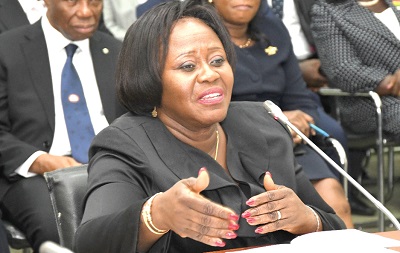The Ghana Voice,
Accra, Ghana

"They Want Me Silenced, But I Won’t Be”: Chief Justice Sackey Torkornoo Breaks Her Silence
The Ghana Voice 25-06-2025In a powerful and emotional statement to the nation on June 25, 2025, Chief Justice Gertrude Sackey Torkornoo stood her ground as she addressed what she described as a historic but dangerously flawed attempt to remove her from office. “This process is not just about me,” she said. “It sets a precedent that could affect every judge and constitutional office holder in Ghana.” Her words reverberated far beyond the confines of her legal robe—echoing a deep concern about the integrity of Ghana’s democracy.
With a steady voice that belied the storm surrounding her, Chief Justice Torkornoo explained that never in Ghana’s 68-year history had a Chief Justice faced a removal hearing. She called the current process an “unprecedented departure from the principles of justice and fairness,” accusing the Committee overseeing her case of ignoring constitutional safeguards and due process. “Every step has violated the very rules we swore to uphold,” she warned.
She spoke not just as a legal officer but as a woman, a wife, a mother, and a Ghanaian who has devoted 38 years to the legal profession—21 of them on the bench. But the process, she said, had left her humiliated: barred from the courtroom without cause, denied the presence of a family member, thoroughly searched, and subjected to hearings at a location infamous for its association with the murder of judges in 1981. “Why was Adu Lodge chosen?” she asked. “To intimidate me?”
According to the Chief Justice, the entire process has lacked transparency. Documents she is supposed to respond to have been withheld. Petitioners have been allowed not to testify, making it impossible to cross-examine them. Even worse, she claims, the Committee abandoned constitutionally mandated inquiry procedures and instead adopted civil litigation tactics, with no clear charges, no defined issues, and no legal foundation.
Chief Justice Torkornoo also revealed a disturbing possibility: that the entire affair may be politically motivated. She disclosed that friends and well-wishers had pleaded with her to resign to preserve her dignity and avoid danger. Others, she said, had issued veiled threats. But resignation, she insisted, would be tantamount to endorsing an illegal process and setting a dangerous precedent. “This isn’t about clinging to power,” she said. “It’s about defending the rule of law.”
The heart of her message, however, wasn’t personal. She painted a bleak picture of a future where all judges and heads of independent institutions could be removed at will, their careers sacrificed at the altar of political convenience. “If this model of removal can be tried on the Chief Justice, it can be repeated with everyone,” she cautioned.
One of the most poignant parts of her address was the personal pain she has had to endure. She recalled that her uncle, Major Sam Acquah, was one of the judges killed in 1981—he had raised her. That the current hearings were being held in a location tied to that dark chapter, she said, could not be a coincidence. “It feels like history is being weaponized against me.”
As for the petitions themselves, the Chief Justice dissected them as baseless and, in some cases, factually inaccurate. From allegations of improperly transferring cases to claims about travel arrangements, she maintained that every action she took was within the scope of her constitutional duties. The evidence, she stressed, had been presented to the President—yet, the process moved ahead without fair examination.
In closing, Chief Justice Torkornoo quoted German pastor Martin Niemöller’s warning about the dangers of silence in the face of injustice. “I will not be silent,” she said, “because silence now means complicity tomorrow.” She appealed not for sympathy but for vigilance: a call to every Ghanaian to stand guard over the nation's hard-won democratic institutions.
